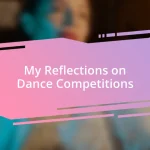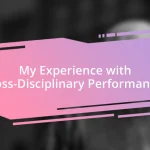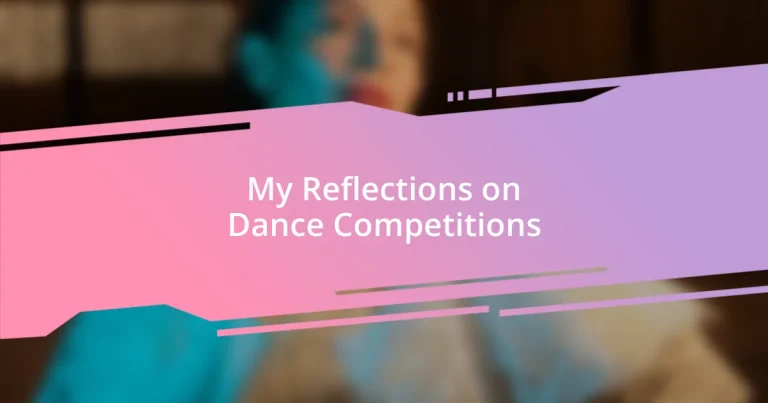Key takeaways:
- Dance competitions foster personal growth through shared experiences, pushing dancers to confront fears and expand their creative expression.
- Effective preparation involves physical conditioning, structured planning, and mental techniques like visualization to enhance performance and manage anxiety.
- Learning from both successes and setbacks is crucial; embracing feedback, adaptability, and celebrating personal milestones enriches the dance journey.
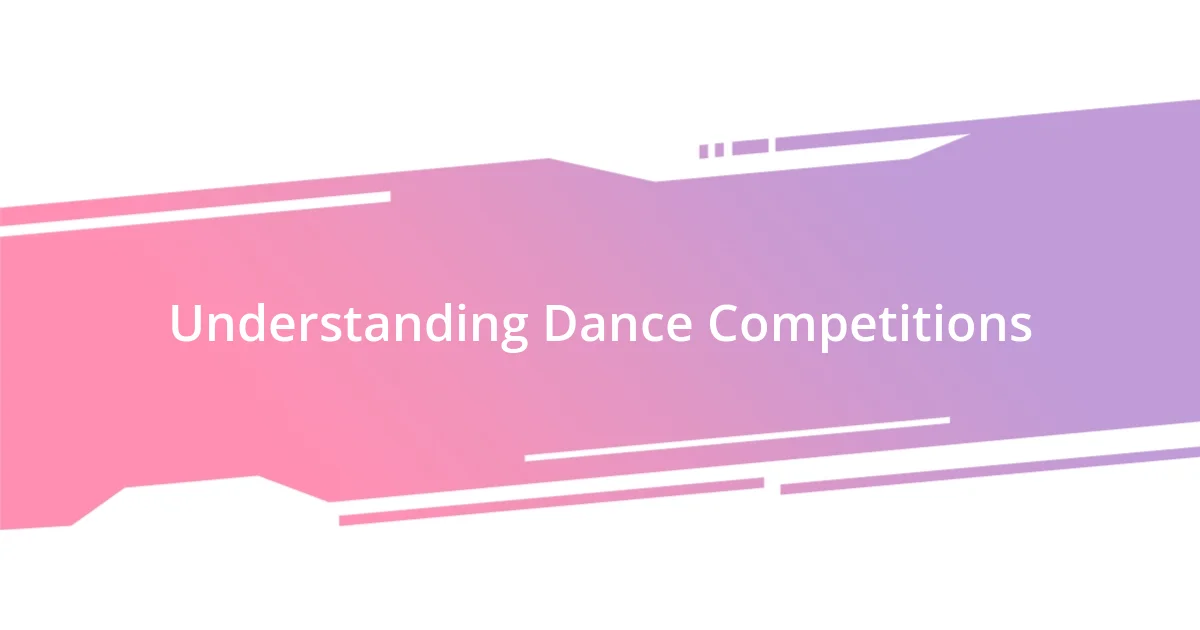
Understanding Dance Competitions
Understanding dance competitions can feel like stepping into a vibrant, exhilarating world where passion meets performance. I remember my first competition vividly; the adrenaline coursing through me as I shared the stage with so many talented dancers was unlike anything I had ever experienced. It’s not just about the trophies or recognition—it’s about the energy, creativity, and camaraderie that thrive in that environment.
For many dancers, competitions serve as a crucible for growth. I found that every performance pushed me to confront my fears and expand my comfort zone. Have you ever felt that rush of exhilaration when you nail a complex move in front of an audience? It’s a powerful reminder of how far we can stretch ourselves, both artistically and emotionally.
In these competitions, judges evaluate not only technical skills but also the dancer’s ability to connect with the audience. I’ve learned that storytelling through movement is crucial. How do you convey a story or emotion without saying a word? This challenge often brings out the most creative sides of dancers, sparking innovative choreography that captivates everyone watching. Embracing this aspect of competition has made me appreciate the art of dance on a deeper level.
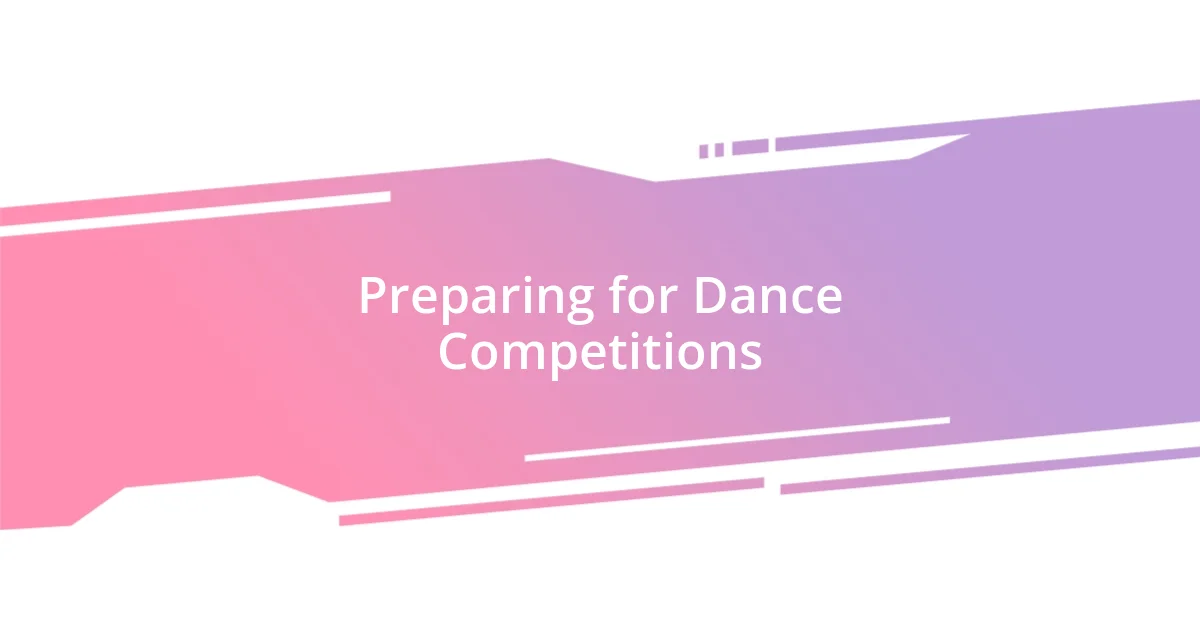
Preparing for Dance Competitions
Preparing for dance competitions involves meticulous planning and mental preparation. When I think about my own experiences, I remember the countless hours spent perfecting routines and rehearsing until every move became second nature. It’s easy to get lost in the excitement of a performance, but I’ve found that creating a structured preparation plan can help ease pre-competition jitters. Have you ever felt overwhelmed the night before a big event? Developing a timeline leading up to the day can really help clarify your priorities and keep anxiety at bay.
Furthermore, physical conditioning is crucial in making sure that I am at my peak performance level. In the weeks leading up to a competition, I focus on strengthening exercises to enhance my stamina. I always plan sessions that target the specific muscles I’ll engage during my dances. It’s interesting to note how a simple change in my warm-up routine can make a significant difference in my performance. Have you noticed similar results when you adjusted your physical preparation? It’s a realization that has transformed my approach to dance.
Lastly, the mental aspect of preparation cannot be underestimated. I remember a time I faced self-doubt right before stepping on stage, but I learned to channel that energy into focus and determination. Visualization techniques, where I imagine my routine going perfectly, really help calm my nerves. How do you prepare mentally for a performance? I’ve found that by embracing a strong mindset, I can perform better and enjoy the experience more fully, no matter the outcome.
| Preparation Aspect | Tips |
|---|---|
| Physical Training | Focus on strength and endurance exercises; adapt warm-up routines to target specific muscle groups. |
| Mental Preparation | Use visualization techniques; practice mindfulness to manage nerves; set realistic performance goals. |
| Planning | Create a timeline for rehearsals; prioritize routines to avoid last-minute stress. |
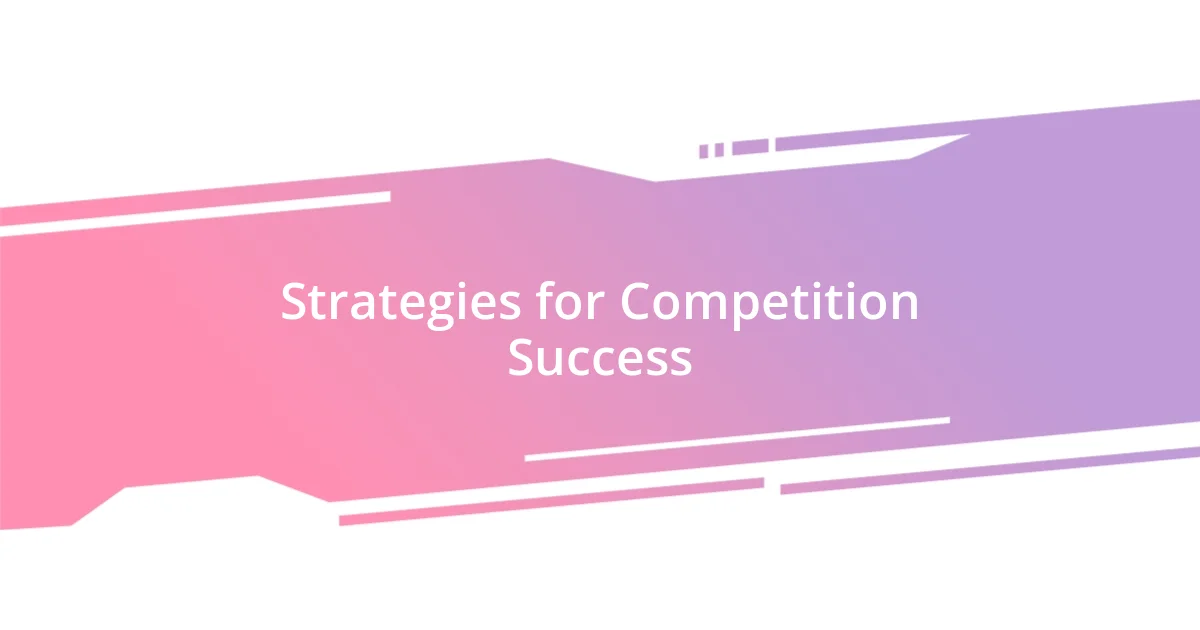
Strategies for Competition Success
Strategies for Competition Success
When aiming for success in dance competitions, developing a solid strategy is key. One of my most pivotal moments came during a particularly challenging competition. I learned that warming up effectively was just as important as mastering my choreography. I remember how a proper warm-up not only prepared my body but also calmed my mind, allowing me to step onto the stage with confidence. The right routine can create a seamless transition from rehearsals to performance, making all the difference in how I felt.
Here are some strategies that have served me well:
- **Practice with Purpose:** Instead of simply repeating routines, focus on perfecting challenging sections during rehearsals. This targeted practice leads to greater confidence on stage.
- **Pre-Competition Rituals:** Develop calming pre-performance rituals—like listening to specific music or doing breathing exercises—that help ground you before going on stage.
- **Embrace Feedback:** After each competition, I analyze judge feedback with an open mind. Constructive criticism, though sometimes tough to digest, is invaluable for growth.
- **Connect Emotionally:** I’ve found that tapping into the emotional core of a piece brings genuine energy to my performance, making it resonate with the audience.
Being aware of your environment can also significantly impact your performance. I’ll never forget a competition where I felt completely thrown off by the lighting changes. After that experience, I made it a point to understand the venue setup during rehearsals. Familiarizing myself with the stage can alleviate unnecessary stress and let me focus on dancing. So, make it a habit to scout venues whenever possible, allowing you to perform with greater ease on competition day.
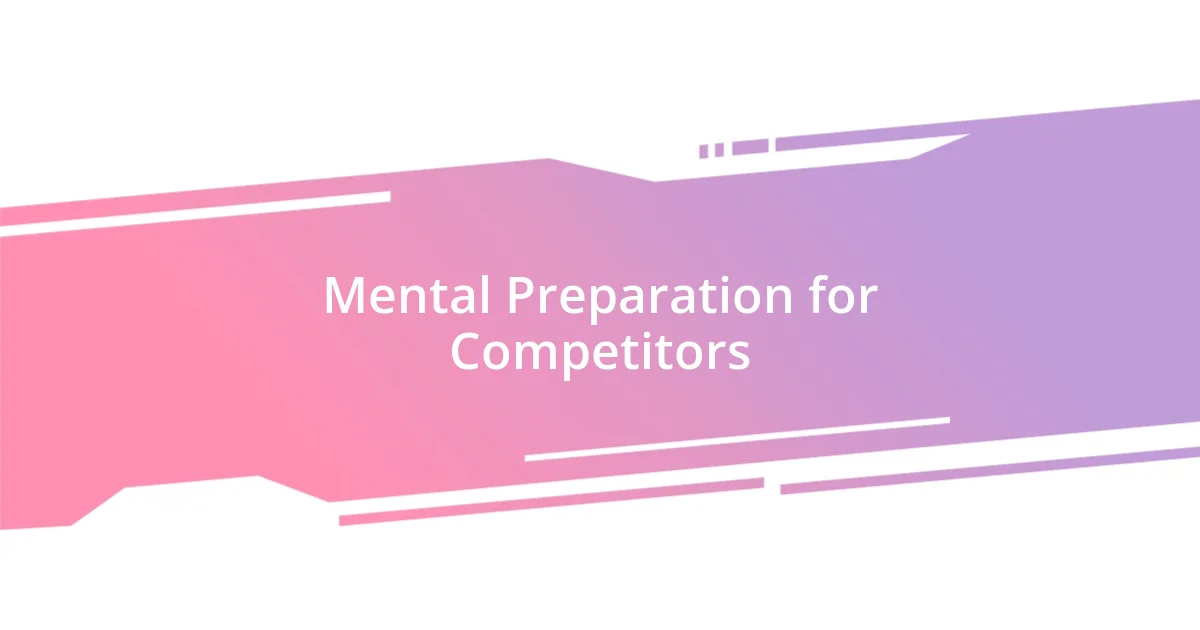
Mental Preparation for Competitors
Mental preparation is often the unsung hero of competition success. I remember one particular competition when nerves nearly got the best of me. Just moments before stepping on stage, I took a deep breath and reminded myself of the hours spent preparing. That small, intentional pause allowed me to regain my focus and perform with confidence. Have you ever experienced a similar moment when you needed to center yourself right before a big performance?
In my journey, I’ve discovered that mindfulness plays a crucial role in mental preparation. I often practice mindfulness techniques like meditation or simple breathing exercises to keep my mind clear. During competitions, I visualize not just the moves but the energy of the audience and the excitement of dancing. It’s fascinating how this practice helps me connect with the moment. How do you harness your focus when the lights are bright and the audience is watching?
Another vital aspect is setting realistic performance goals. Reflecting on my past competitions, I learned that aiming for perfection can actually create pressure and anxiety. Instead, I choose to focus on my growth and improvement. Before each competition, I remind myself of my personal goals, like feeling the music or engaging with my fellow dancers. What goals resonate with you? This shift in mindset has transformed my experience on stage, allowing me to enjoy the dance rather than just the outcome.
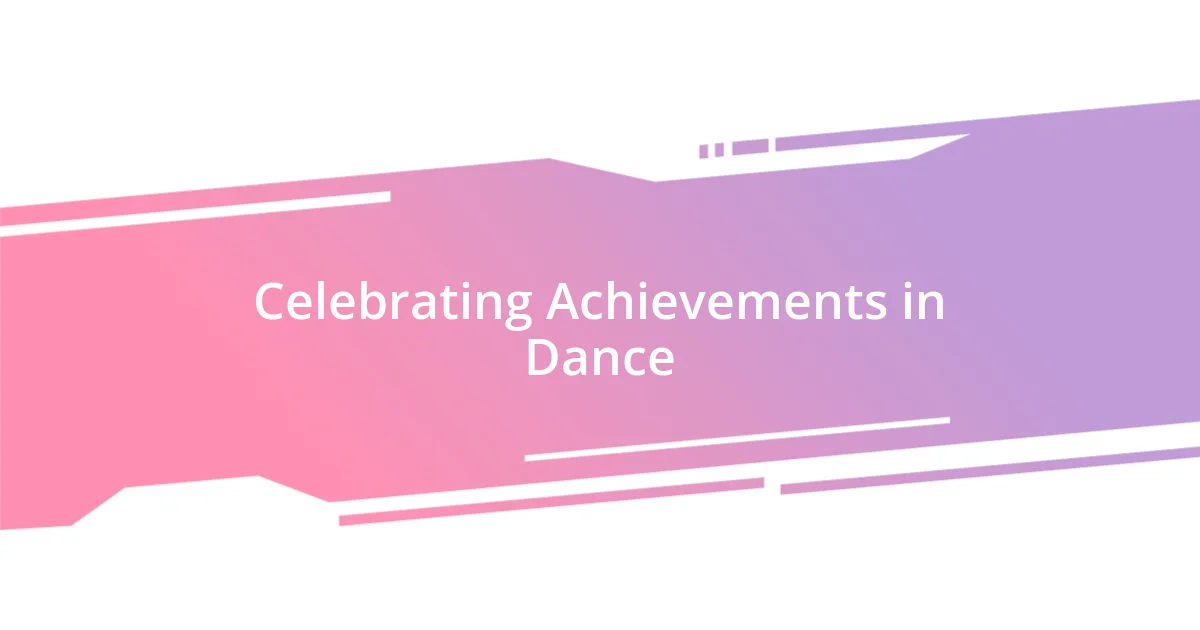
Celebrating Achievements in Dance
To me, celebrating achievements in dance is about recognizing not just the trophies, but the journey that brought us there. I remember a competition where, despite not placing as high as I hoped, I received a special mention for my performance’s emotional depth. It was a humbling moment that taught me to focus on the emotional connection I shared with my audience—something I continue to prioritize with each performance.
Every little milestone matters in this art form. I cherish the memory of a long-awaited improvement in my technique that came just in time for a regional competition. Looking back, I realize how each practice session and late-night rehearsal crafted a sense of accomplishment, which made the whole experience worthwhile. Isn’t it incredible how our dedication can shape our path in ways we least expect?
Moreover, I’ve learned that achievements aren’t only about recognition from judges. For me, they often come in the form of personal breakthroughs—like overcoming stage fright during my first solo. It opened the door to so much more joy in dancing. This leads me to wonder: What moments have defined your dance journey? Celebrating those personal victories can be just as powerful, if not more so, than any award received on stage.
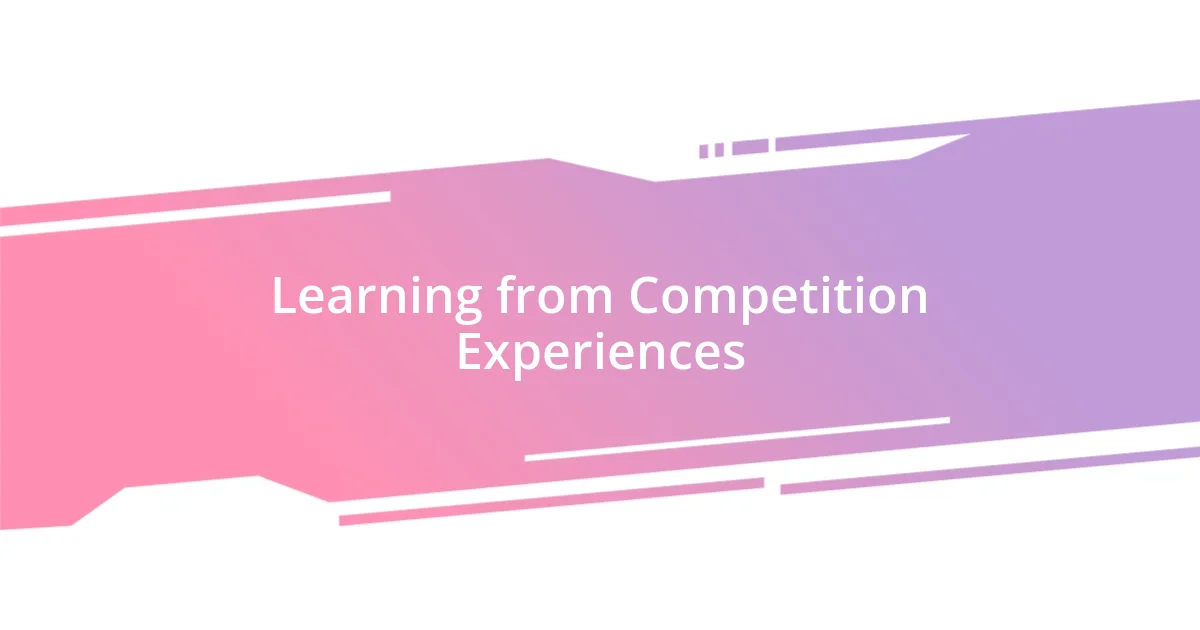
Learning from Competition Experiences
When reflecting on my competition experiences, I often think about the lessons learned from unexpected outcomes. One year, I entered a competition feeling prepared and confident, only to falter during my performance. Instead of wallowing in disappointment, I took it as an opportunity to assess what went wrong. That self-reflection not only strengthened my skills but helped me understand the importance of resilience. Have you ever turned a setback into a stepping stone for your growth?
I also realized that competition is an invaluable teacher for learning about teamwork and collaboration. I vividly recall a competition where my dance partner and I had a miscommunication during our routine. Rather than letting the mistake derail us, we laughed it off and made a spontaneous change on stage, which ended up being one of the highlights of our performance. That moment demonstrated to me how adaptability is crucial not only in dance but in life. How do you handle surprises when things don’t go as planned?
Additionally, competition experiences have made me appreciate the importance of feedback. After a particularly challenging event, I sought advice from my coach, who pointed out nuances I hadn’t even considered. Implementing her feedback transformed my approach in subsequent competitions. I now encourage myself to seek constructive criticism from peers and mentors, seeing it as an essential part of my development. What about you? How do you embrace feedback to elevate your performance?

